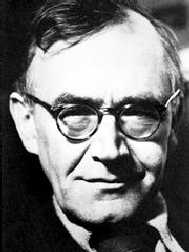| Swiss
reformed theologian of "neo-orthodoxy," or "crisis theology" who criticized
liberalism and Nazism. |
 |
|
|
Karl Barth was born
in Basel, Switzerland, and trained in liberal
theology in Germany. After serving as a parish pastor during World
War I, Barth could no longer subscribe to liberal optimism about the human
condition. In 1922 he published his Commentary on the Romans, stressing
human sin as beyond repair and God as beyond our reach. Romans
is said to have "fallen like a bombshell on the playground of liberal
theologians." In this and later writings, Barth dismantled Schleiermacher's
interior view of religion as a feeling of absolute dependence. Instead
Barth insisted that God is outside of us, "wholly other." God is not revealed
by a feeling in the human heart or in social progress, but through Scripture
and the preaching of it. In his 1932 Church Dogmatics, Barth argued
that God's Word meets human beings in crises of judgment and mercy. Barth
was expelled from Germany by the Nazis for his role in the Confessing
Church. He then became a professor in Basel, Switzerland, and is remembered
by many as the greatest theologian of the twentieth-century.
|